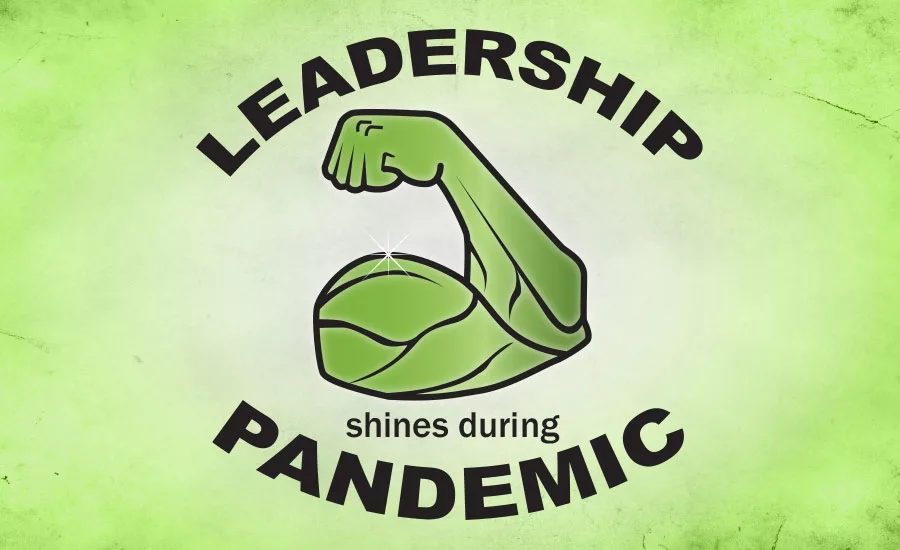Cover Feature
Beverage leaders exhibit agility, resilience
Beverage community protects frontline workers while accelerating eCommerce, technology advancements

“Goonies never say die.” The iconic quote from the 1985 cult classic film “The Goonies” has led to the creation of T-shirts, posters, flags and even a rock band brandishing the name. Although the quote’s origins stem from the optimism and determination of a friend’s safe escape, the symbolism behind it signifies the true resiliency and agility it takes from leaders during moments of crisis.
When day-to-day life changed throughout the United States in March, beverage market leaders had to step into action to protect their frontline workers while preserving business operations. Additionally, these leaders sought to meet the needs of their distribution and retails partners and ultimately the consumers as demands and needs shifted during these unprecedented times.
“People throughout the world have been impacted by the coronavirus pandemic,” says Kathleen Ciaramello, president of foodservice and on-premise for Coca-Cola North America at The Coca-Cola Co., Atlanta. “Similarly, Coca-Cola’s business has not been immune to the effects of the COVID-19 pandemic. At Coca-Cola, we are doing our part to help prevent the further spread of the virus, while also supporting the needs of our customers, consumers, employees and communities.
“We have — and always will — put the health, safety and security of people first,” she continues. “Our approach is grounded in our company’s purpose, which ensures that we continuously strive to make a difference for people in our communities and in our workplaces.”
For the beverage alcohol industry, the most notable change was the vast shutdown of on-premise establishments. Pete Carr, regional president for Bacardi North America, Coral Gables, Fla., notes that this prompted the spirits manufacturer to aid those in need while also adjusting go-to-market strategies.
“The biggest impact is the closure of bars and restaurants, which represent about 30 percent of our U.S. business and the livelihoods of many people near and dear to us. Small businesses and hard workers lost their business and paychecks, virtually overnight, as dining out, nightlife, and entertainment were put on pause. That’s why Bacardi Ltd. launched the #RaiseYourSpirits, a $4 million pledge dedicated to providing financial aid and other relief to bar teams who serve as the backbone of the spirits business.
“For us, this meant moving our attention and resources to where consumers were shopping,” he continues. “Before COVID, only 1 percent of spirits sales were online and, because of lockdowns, people have discovered that they can buy spirits with the click of a button and have them delivered right to their door. Suddenly, this new option was on fire with growth rates of Bacardi online sales jump to 400 percent compared to the previous year. From Instacart, Drizly, Reserve Bar and other channels, our combined eCommerce efforts delivered in just three months what we expected to sell in a full fiscal year.”
Carr notes that eCommerce outlets already were part of Bacardi’s long-term strategy, but ramped up front and center this spring. “The pandemic accelerated our plans and the growth and activity we expected to build in eCommerce over two years was done by our team in only two weeks,” he adds.
However, go-to-market strategy was not the only shift that Bacardi’s leadership altered. The company took steps to preserve the work status for its employees who traditionally serve the on-premise market.
“For some teams, their regular day-to-day jobs of working with bars, restaurants, hotels and nightclubs dried up,” Carr says. “We made a business decision to keep their roles and shift their focus on projects that could help these accounts adapt to new rules and prepare for re-opening when the time was right in their local markets. Bacardi teams were reassigned to help accounts with ‘To-Go Taskforces’ offering solutions to quickly jump on new to-go cocktail allowances, while others helped figure out QR code menus, simplified cocktail listings, how to reset spaces for social distancing and more.
“Some team members who generally spent their days visiting bars began joining our commercial teams visiting stores and setting up product displays,” he continues. “Teams who used to produce festivals, all of which were canceled, moved to support virtual education and programming. The entrepreneurial and family spirit of Bacardi really came alive during this time and I couldn’t be prouder of the people who rolled up their sleeves, jumped into new spaces, and helped out wherever needed — regardless of job title.”
Frontline protection
Although shifting focus to eCommerce and retail resulted in a big change, beverage leadership’s most necessary efforts was to protect its frontline workers.
Coca-Cola’s Ciaramello notes that it’s the frontline workers who are keeping communities going during this pandemic, thus, it’s important to ensure the best protection for them.
“I'd like to express my thanks to the countless people on the frontlines who are working to improve our communities worldwide,” she says. “I also want to recognize my colleagues across the Coca-Cola Company and our bottling system for their tireless efforts in prioritizing the safety of our people, ensuring the resiliency of our supply chain, supporting our customers and for being a force for good in their communities.
“In some locations, delivery drivers do not leave their trucks, reducing person-to-person interactions,” Ciaramello continues. “And, some manufacturing plants have implemented split shifts to avoid shift-to-shift contact. We have reinforced hygiene and exposure guidelines with our employees. If we become aware that an employee is ill or had direct or indirect contact with someone with COVID-19, we will immediately implement our isolation and sanitization protocols and will begin any necessary quarantines, in line with guidance from local health officials.”
Bacardi’s Carr emphasizes that safety is a top priority, and that the spirits manufacturer has put in new safety protocols to protect its workers.
“All operations staff who could work from home shifted to that model immediately,” he says. “For those needed on site to manage production or bottling did so when new safety measures, including temperature checks, protective gear, social distancing and more. Our other ‘frontline’ consists of teams visiting stores and they too were provided with the safety gear, hand sanitizers, and other equipment to keep them safe.
“And we always communicated that anyone who felt they were at high risk for personal reasons could find other ways to complete the work,” Carr continues. “It was important for people to feel they had the right resources and accommodations to be safe. Flexibility and empathy have been the most important factors in providing the right support to all our team members.”
The response to protecting frontline workers can be found throughout the beverage market. For instance, Purchase, N.Y.-based PepsiCo Inc. announced in March that it now offered enhanced benefits to all U.S.-based employees and additional compensation to U.S. frontline employees — the women and men who make, move and sell products — amidst the pandemic. The additional compensation covers more than 90,000 frontline employees at both PepsiCo Beverages North America (PBNA) and PepsiCo Foods North America (PFNA) and consists of a minimum of an incremental $100 a week for full-time employees over the next month from the announcement. PepsiCo also announced it would hire 6,000 new, full-time, full-benefit frontline employees across the U.S. in the coming months.
"At this unprecedented time, which is having a profound impact on all of us, we are so grateful to our frontline employees for all they are doing to ensure our products are available for families across the country," said Kirk Tanner, chief executive officer of PepsiCo Beverages North America, in a statement at the time. "We know our products on store shelves provide a sense of stability and normalcy to consumers during trying times. This is our way to recognize the critical role our frontline plays in our organization, now and always."
St. Louis-based Anheuser-Busch took a similar approach for its frontline workers with its company website noting that the domestic beer manufacturer “implemented a number of precautionary measures that go above and beyond CDC recommendations, including social spacing protocols, enhanced sanitization, [and] extensive screening measures.”
Resilient community
Although the effects of the pandemic will not go away anytime soon, beverage market leaders continue to show that the industry is well prepared to navigate this challenging market.
“If this experience has shown us anything, it’s that as a company and community, we are resilient,” Coca-Cola’s Ciaramello says. “With a combination of focus and flexibility we have been able to make strategic moves to continue to be the best partner to our customers, provide beverages for our consumers and protect the health and well-being of our employees. The COVID-19 pandemic is sure to have a lasting impact on the world around us.
“Changes that we may feel are temporary now could remain a part of life for the long term or permanently,” she continues. “We are proud to partner with our customers on innovative solutions as we collectively navigate the rapidly changing landscape. One example is contactless, mobile pouring from a smartphone for Coca-Cola Freestyle that we announced in July — a technology solution that helps our partners offer their guests touch-free service on a platform they love.”
Bacardi’s Carr also highlights how agile, flexible and quick-thinking the company and its people are in the midst of a crisis.
“A reason we were able to pivot quickly with partners is because, at Bacardi, relationships matter,” he says. “This is a family owned business, after seven generations, and we never treat partners or people as transactions. They are part of our extended family and we always say we are in a relationship-building business.
“Had we not taken the time to build those connections beforehand, then I don’t believe we could have accomplished everything we needed to get done from a hand sanitizer production, to setting up relief programs, to even accelerating our eCommerce game,” Carr continues. “All of these took the support and collaboration from others and we are so grateful to them for working side-by-side with Bacardi as we moved quickly to support communities and the business.”
Looking for a reprint of this article?
From high-res PDFs to custom plaques, order your copy today!





